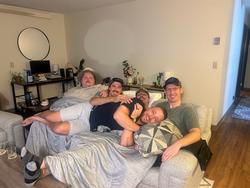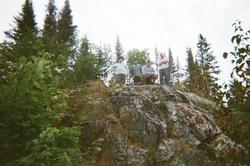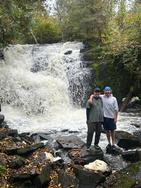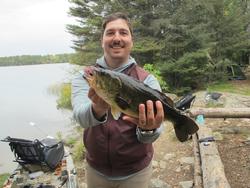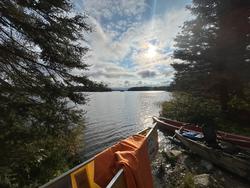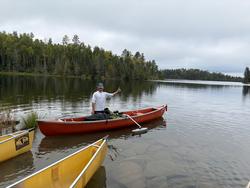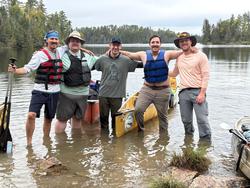BWCA Entry Point, Route, and Trip Report Blog
September 25 2025
Entry Point 26 - Wood Lake
Number of Permits per Day: 2
Elevation: 1361 feet
Latitude: 47.9691
Longitude: -91.6001
Wood Lake - 26
From City Streets to Canoe Seats: Far From Disappointed
Entry Date:
September 16, 2025
Entry Point:
Snowbank Lake
Number of Days:
6
Group Size:
5
The trip began like all the best ones do: with a loaded truck, a late afternoon departure, and the kind of excitement that only builds as the city fades in the rearview.
Kev, John, and I rolled out of the Twin Cities around 3:30 p.m., a canoe and a kayak strapped tight up top, already looking like we meant business. The highway carried us north to Duluth, where we pulled in around 6:00 p.m., greeted by lake air and a familiar friend.
We met up with Ryan, who graciously hosted us for the night, and kicked things off the right way with dinner at OMC Smokehouse. A pre-wilderness feast of smoked meats and comfort food, already dreaming of freeze-dried meals and trail mix. Afterward, we made our way to Bent Paddle Brewing for a few cold beers and that’s where we met the final member of our crew: Matt. With the team officially assembled, the excitement really started to build.
Back at Ryan’s place, the night wrapped with maps spread out and route talk flowing we finalized our plans for our first day in the Boundary Waters, talking portages, campsites, and early-morning logistics. With alarms set for 4:00 a.m., we tried (with varying success) to catch a few hours of sleep before the real adventure began.
Next stop: Ely and Snowbank Lake and the beginning of our route into the quiet.
The alarms went off early at 4:00 a.m. sharp and by 4:30, we were on the road to Ely with bleary eyes, strong coffee, and gear packed to the brim. After a quiet northern drive through the early morning fog, we arrived at Snowbank Lodge around 7:00 a.m.. The canoes and kayak came off the truck, packs were shuffled and sorted, and by 7:30, we were pushing off from the dock into calm water and clear skies.
The paddle across Snowbank Lake was long and steady with true BWCA mileage right out of the gate. We made our way up to the northern tip, bound for the portage into Boot Lake. Along the way, I broke in the kayak and the rod with a solid start. Two fighting pike while trolling along the paddle and a nice smallmouth landed in the small bay just before the Boot Lake portage. All were released, but spirits were high.
That said, this was also the moment of realization: bringing an ~90-pound, 11’8” kayak into a 10-portage loop may not have been the wisest move. Muscling that thing across the first portage into Boot was our wake-up call that this wasn’t going to be a vacation; it was a challenge.
Our plan was to camp on Boot Lake the first night, but both sites were already claimed. This is a situation that most paddles in the BWCA have experienced. This can be an intense anxiety filled time where you are not sure how long the day is ahead. With limited options, we had to keep moving, aiming for the solo site on Abinodji and praying it would be open.
After grinding through a brutally tough portage into Abinodji, we were beyond relieved to find the site empty and waiting for us. It wasn’t exactly five-star, but in that moment, it felt like home. Had it been taken, we would’ve faced a tough decision. Push on through four more portages to Jordan Lake, well beyond our planned route, or tackle six more to reach Ahsub. Cramming two days of hard travel into one. Either option would’ve meant serious extra miles, time we didn’t have, and energy we’d already spent.
We set up camp, filtered water, and let our bodies recover. A small fire under the stars closed out the day, along with a few sips of whiskey and some dehydrated dinners, the reward for miles paddled and portages survived. The mosquitos eventually called curfew, but not before we caught a few more bass and pike, all of which were also released due to size.
This was the first trip to Canoe country for our members John and Matt. The rest of our team did what we could to keep morale high as we knew our next site would be much better.
It wasn’t our ideal first night plan, but it was BWCA through and through flexible, wild, and unforgettable.
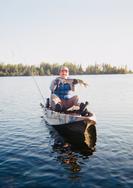
~Snowbank Lake, Boot Lake, Abinodji Lake
Day Two started early on Abinodji Lake, under gray skies and a damp chill in the air. The forecast hadn’t lied. Sprinkles drifted in and out all morning, and a steady, cool breeze followed us like a shadow. It wasn’t a full-on downpour, but it was enough to keep our rain jackets close and everything just a little damp. Still, spirits were decent. We packed up camp and made the short paddle to the portage into Swing Lake, then another quick crossing brought us into Gibson. Even with the weather, our morning was moving along smoothly. There was a rhythm to it now: paddle, portage, repeat. Wet boots, slick rocks, and the kind of chilled fingers you just learn to live with were what the day beheld.
The highlight of the day by far was our stop at Cattyman Falls.
Even in the dreary weather, the falls were breathtaking. Maybe even more so in the gray mist, as if nature itself was wrapped in mystery. The sound of rushing water echoed through the trees with a force that felt ancient and alive, a reminder of the wild beauty of creation. We paused longer than usual to take it in. Some of us even braved the freezing pool beneath the falls for a quick, shockingly cold dip Equal parts adrenaline and baptism, like being briefly swept into something bigger than ourselves.
With clothes a little wetter and hearts a little fuller, we continued on with the goal of reaching Disappointment Lake before the day wore us down. The wind stayed against us, the air stayed cool, and the occasional light rain kept us humble, but the team was clicking by trading off portage duties, keeping pace, and moving forward.
As we entered Disappointment, we were hit with a familiar feeling... Crowds. Several boats in view and campsites already claimed. The anxiety crept in again.
We broke into teams: -Ryan and John took off at full paddle speed toward our top-choice sites. -Matt and Kevin were assigned to scout any available sites and radio back if they found anything open. -I stayed behind in one of the bays, tasked with catching dinner.
While casting, I crossed paths with a group heading north who said, “No campsites open.” My stomach sank. I started to feel… well… Disappointed.
And then, the radio crackled to life: “We got the last site. Over.” – John
Not just any site either. Our goal site. The one we’d hoped for all along.
The relief was overwhelming, just like the day before. That mix of exhaustion and victory you only get in the wilderness.
Dinner didn’t come from the lake despite my best efforts The fish just weren’t biting. So once again, it was sipping whiskey and dehydrated meals as the sun dipped behind the clouds we never quite escaped.
Still, there was a silver lining. We were staying put now, and setting up camp felt different when you knew you didn’t have to break it down in the morning. I set up my new hammock and rain fly for the first time, and after one night in it, I was sold. I’m never going back to a tent. Slept warmer and better than I ever have on the ground.
Matt and John were clearly happier here, too. After the squeeze on Abinodji, this site felt like a reward: better views, more space, and a much-needed morale boost after a long, cold, soggy push.
We ended the day huddled around the fire, the smoke fighting off the chill, laughing just enough to forget the weather and knowing the next few days would be spent right here, in the heart of the wilderness.
~Abinodji Lake, Swing Lake, Gibson Lake, Cattyman Lake, Adventure Lake, Jitterbug Lake, Ahsub Lake, Disappointment Lake
We woke up on Disappointment Lake to calm waters, gray skies still lingering, and the sweet stillness of not having to pack up and move. It was our first real basecamp day, and we were ready to make the most of it.
John, Kev, and I launched early with one mission: catch breakfast. Luckily, the fish lords smiled upon us. Between the three of us, we pulled in a solid morning haul, a walleye and two healthy bass. The second bass I landed was an absolute brute. A big, beautiful fish that would end up feeding the whole crew.
Back at camp, we got to work. Fish were cleaned with expert precision by Kevin, our unofficial sushi chef of the Northwoods, whose fillet work was as clean and confident as any backcountry pro.
Meanwhile, Matt, our talented and dependable camp chef, brought it all together in the pan: hot oil, fresh fillets, breading, and a finishing touch of lemon, salt, pepper, and dill. The result? A shore lunch feast that had us licking our fingers and refueling for the day ahead.
From there, the day slowed into a perfect BWCA rhythm. We collected and processed firewood, explored the edges of our campsite, and played some catch with a football under the tall red pines. A few of us swam. A few cast lines again. And the whole day was colored by a growing sense of ease, like we’d finally hit our stride out here.
That night around the fire, the mood was noticeably lighter, and more joyful. Bellies were full, weather was holding, and spirits were high. But, something else had happened too. ee had each started to settle into our roles: -Ryan was the lumberjack, constantly hunting down deadfall and processing trees like a one-man wood mill. -John became our fire master, able to coax flames out of soaked logs and keep the blaze steady no matter the weather. -Kevin held it down as the fish cleaner, slicing and filleting with the calm focus of a seasoned pro. -Matt had clearly earned the title of camp chef, turning raw fish and trail food into some of the best meals we’d had in days. -And I had become the fisherman, consistently landing catches that kept the team’s spirits and stomachs hopeful.
We laughed about it, but deep down we knew it was real, the wilderness was shaping us into a unit. Everyone had found their rhythm. Every role mattered.
That night, with the fire crackling low and the stars trying to peek through a thin veil of clouds, we shared our favorite moments from the trip so far. The long paddles, the tough portages, the victories, the little surprises—all of it was starting to form a story we’d remember for years. We crawled into our sleeping spots with full hearts, a good rhythm, and hopes for another day of fish, fire, and simple living.
Day Four started gloomy inside and out.
The skies were heavy, the lake was quiet, and the air still held that chilling breeze we’d grown used to. I set out alone that morning, hoping a few hours on the water might shake off the fog in my head. I managed to land one eater-sized bass, but it came at a cost. Three of my favorite lures were lost to the deep, snagged and buried in a mess of sunken, waterlogged timber. And to top it off, no matter which direction I paddled, it felt like the wind was always in my face.
By the time I got back to camp, my mood was shot. Tired, cold, and irritated by the lack of fish and lure loss, I sat by the fire while we passed around the small catch for breakfast. I realized I had nothing planned for the day and no motivation to do anything at all.
So I left.
Around 10:30 a.m., I pushed off again from camp and decided to troll the lake solo, hoping a few hours of silence and steady paddling might reset my mind. I was out there for five hours, just me and the lake. Long enough that the crew back at camp started to worry.
But then, something shifted.
The sun broke through the clouds, the first real sunlight we’d seen in days, and suddenly the mood changed. The breeze softened. The air warmed. And as if cued by the creator Himself, the fishing picked up.
By the time I returned around 3:30 p.m., I had released a pike and a few bass, and brought back two beautiful walleye for dinner. As I pulled up to camp, I saw four relieved faces on shore, happy to see me safe, and even happier to see fish in hand. After the slow start to the day, this moment felt like a hard-earned win.
That night, we skipped the traditional shore lunch and let Matt, the camp chef, go full gourmet. He pan-seared the walleye fillets, then deglazed the pan with butter, white wine, and dill, creating a sauce from the golden remnants left behind. It was rich, bright, and unforgettable. A meal worthy of a supper club, made with just a small pan and a little creativity on the shores of a quiet lake.
We shared it together over the fire, passing the plate and soaking in a kind of fellowship you can only find in the woods. No distractions, no background noise, just stories, gratitude, and good food.
After dinner, we all took a group plunge into the cold lake. A final, frigid dip that somehow brought us closer. We dried off around the fire, passing around a bottle of whiskey to keep warm, feeling the weight of the trip in our bodies and the closeness of our group in our hearts.
That night, as we settled into our hammocks and tents, a steady rain rolled in as we said goodnight to our final night in the BWCA. The wind rattled the tarps and rain pattered steadily above us. It was one of those sleeps where you rest, but never quite fully. Half-dreaming of an early paddle out and the return to the world we’d left behind.
We knew the trip was almost over. But in that quiet stormy night, surrounded by damp clothes, full stomachs, and tired smiles, we felt the richness of what we’d just experienced and how rare it is to live this simply and this fully, even if only for a few days.
Our final morning in the Boundary Waters began early. The group rose quietly and got to work, each of us knowing what needed to be done without much talk. We broke down camp for the last time by packing wet clothes, soaked tarps, sagging tents, and grimy tools into our bags. Everything was damp, heavy, and had the unmistakable smell of four days in the wild. It wasn’t glamorous, but it felt… earned.
With packs cinched down and boats loaded, we shoved off from Disappointment Lake for the last time. And just like that, the clouds parted. For the first time in days, we were gifted truly beautiful weather—sunlight, calm water, and the kind of stillness you don’t forget. The entire lake seemed to glow with peace. As we paddled quietly across the glassy surface, two trumpeter swans soared overhead, landing gracefully near the southwestern shore. It felt like a final, gentle reminder of just how special this place is.
Eventually, we reached the final portage of the trip, the trail from Disappointment back to Snowbank Lake. It had been marked on the map as an L7, and we were mentally prepared for a real grinder. But in the end, the rating felt a little dramatic. Sure, it was long, but the path was relatively flat with a gradual descent, and we moved through it steadily. After all we’d been through, this portage felt more like a farewell hike than a punishment.
Once we dropped our boats into Snowbank, the skies had already started to shift again. Clouds rolled in, the wind picked up, and some solid swells reminded us that the BWCA wasn’t going to let us go too easily.
Then came the final paddle.
Ryan and John, feeling strong, surged ahead. maybe a little too confidently... Instead of rounding the southcentral peninsula toward Snowbank Lodge, they mistakenly paddled southeast deep into Pickerel Bay, adding a fair chunk of distance to their route. After we flagged them down and pointed out the misstep, they pivoted and once again took the lead, racing to the finish.
Snowbank is a big lake, and navigating it under pressure and wind is no joke. We pulled out the map more than once to make sure we were on track. Even on the last day, it was a reminder: in the Boundary Waters, you’re never really coasting. You're always earning it.
Finally, after nearly an hour and a half of steady paddling, we saw the familiar shoreline of Snowbank Lodge. It was a relief unlike any other. We pulled in, backs sore, faces windburned, and muscles humming from the miles.
A round of cold beers from the lodge were cracked as we loaded our soggy gear into the truck and strapped the canoe and kayak back onto the roof. And just like that, the wilderness faded behind us as we called our loved ones and reported we were back to safety.
We made the drive back to Duluth, dropped Ryan and Matt off with a round of thanks and hugs, and continued our long ride south to the Twin Cities. After hours on the road and plenty of silence in the truck, we finally pulled into my driveway around 7:00 p.m.
Kev, bless his heart, kept us safe and steady the entire trip. Chauffeur, paddler, and road warrior in one. After unloading my gear, he still had to drive John home, and then himself. The man put in serious miles, both on the water and behind the wheel.
Tired, stiff, and still half-smelling of smoke and lake water, I stepped inside to see my 10-month-old son’s face light up. His wide, four-toothed smile greeting me like sunshine. It was the longest I’d been away since he was born, and in that moment, as my wife scooped him up for bedtime, I felt it all land: Gratitude. Exhaustion. Wholeness.
There’s something undeniably sacred about the Boundary Waters. A place where time slows down and life simplifies to its most honest form. Out there, beneath towering pines and star-strewn skies, we’re stripped of distraction and reminded of who we are when there’s nothing left to prove. The challenges, wet portages, long paddles, and cold mornings, somehow become part of the reward. Forging a bond not just with each other, but with the land itself. We came for fish, fire, and solitude and we found all three. But we also found laughter in the rain, peace in the stillness, and a quiet kind of joy in every hard-earned mile. To paddle those lakes is to know something deeper about yourself and the people you travel with. The Boundary Waters doesn’t just give you memories, it gives you perspective. And for that, we are grateful for the gift that God has shared with us.
~Disappointment Lake, Snowbank Lake


